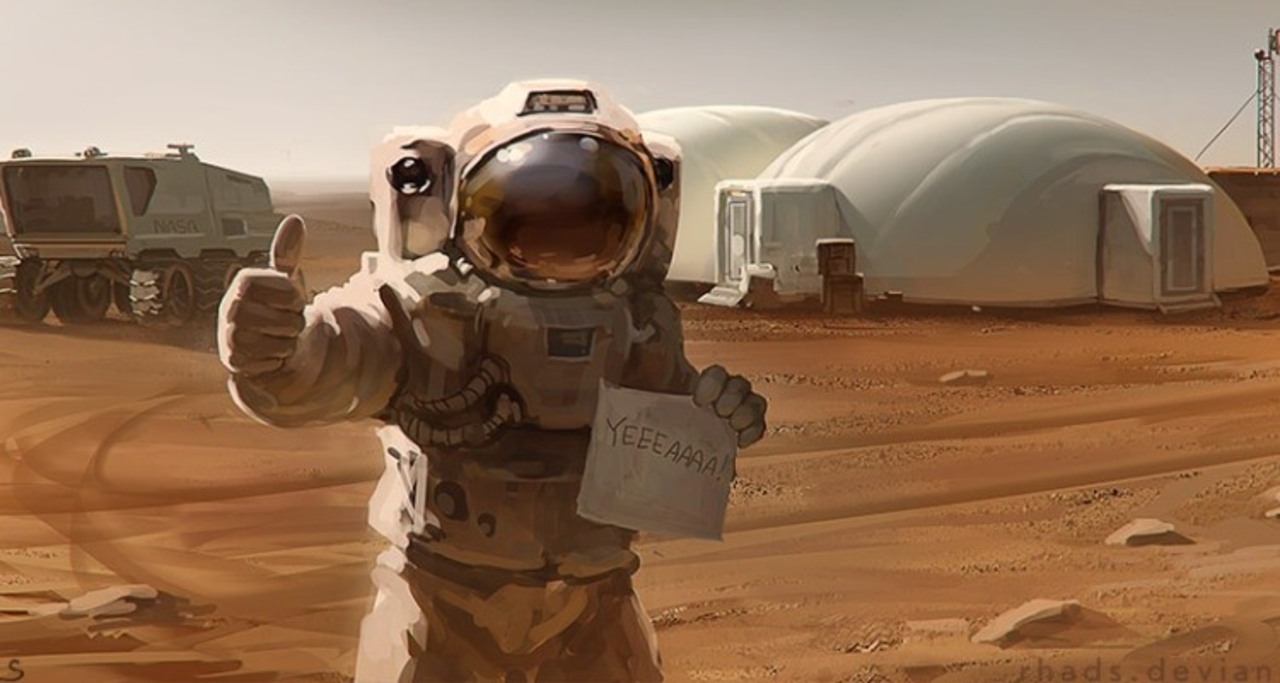The Martian
Jayne English
 “Fiction’s about what it is to be a fucking human being.”
––David Foster Wallace
“Fiction’s about what it is to be a fucking human being.”
––David Foster Wallace
There was a lot to enjoy in Ridley Scott’s The Martian. Intriguing science fiction, a beautifully austere landscape, an admirable main character––Mark Watney (Matt Damon)––who was innovative, resilient, funny, and humble – all made the film great entertainment. But, for all it was, it could have been much more.
What is the difference between entertaining science fiction and classic science fiction? Isn’t it the human element that makes a story last in the memory of a culture? Scott’s Martian, focused on Watney’s science of survival, left out Watney’s humanity. As one reviewer wrote: “The relentless focus on technical achievement, in the absence of the complexity of the characters—in the absence of cultural identities and emotional connections, backstories and ambitions, the drive of will and ideological commitment, of fantasy and distraction—is the very antithesis of artistic creation.” The Martian would have tipped into the realm of something weightier if it included more of this aspect of Tracy K. Smith’s poem “The Weather in Space”:
When the storm
Kicks up and nothing is ours, we go chasing
After all we’re certain to lose, so alive—
Faces radiant with panic.
For more humanness, there should have been more questions. Bowie knew this when he phrased the title of his song as a question, “Life on Mars?” His title lends ambiguity to the confusion of Earth-bound scenes in the song. Is the song expressing the desire to escape the familiar? Is it the experience of feeling alienated in the familiar? Ambiguity, instead of Watney’s super smart solutions to difficult problems, would have eased the film into the realm of lasting art because it would allow the audience to consider possible interpretations. As Neil McCormick said of Bowie’s song, it is “at once completely impenetrable and yet resonant with personal meaning.” When Watney shaves a wooden cross because it is the only material at his disposal that is not flame-retardant, he says to the cross, “I'm assuming you'll be all right with this considering my situation.” His comment shows deference, but a simple moment of hesitation before he began would have raised more questions in the audience’s mind about the range of emotions––fear, doubt, hope––that Watney must have been experiencing, considering his situation. Wouldn’t it have let the viewer put their own “personal meaning” into that one motion giving it a far greater scope? It’s the murky non answers that lead us to deeper discovery. McCormick continues: “Bowie’s abstract cut-up lyrics force you to invest the song with something of yourself just to make sense of the experience, and then carries you away to a place resonant with intense, individual emotion.” The Martian would have had universal appeal if it moved through the shadows, rather than delivering the up-front explanations of Watney’s self-dialog.
Watney didn’t leave a wife, girlfriend or children behind on Earth. For that reason, the broader scope of longing was absent from his motivation to get home and be reunited with them. He did have parents waiting for him. And the letter he wrote to them in case he did not make it home was – nice. But it wasn’t tense, or fraught, or mirroring any aspect of missing them from millions of miles away. Overlooking the Martian landscape, its desolation, emptiness, barrenness, its loneliness, he was in control and reasoned, "I could die for that, something bigger." Knowing Watney was surrounded by sky and martian dust, silence and lostness, we should have felt desperation in that letter.
The Martian could have shifted into a movie about the human spirit instead of individualism. There was a weak attempt to play up a sense of lost community with banter when Watney (by now we know he’s a brilliant PhD) was again able to communicate with his coworkers. They teased him good-naturedly saying things like, “We have to do your job, but how hard can it be, you're just a botanist.” He told them immediately that his potential (though we could say at that point in the movie, probable) death on Mars was not their fault. A little resentment toward them for leaving him would have gone a long way in connecting to something human in all of us about betrayal and abandonment. Something transcendent would have anchored us in the Mars storm––something to resonate with our own times of alienation and lostness.
The ending invoked MacGyver solutions when Watney aligned his craft to a ship passing overhead with the use of a ball point pen after NASA’s efforts failed. Leaving out this innovative way for Watney to rescue himself single-handedly, would have given us room to wonder about his return, about life and death and sacrifice.
Hollywood will do what Hollywood does, exaggerate a situation to play up a hero’s strengths. But this American spirit movie had all the elements it needed to be something classic. Something human.